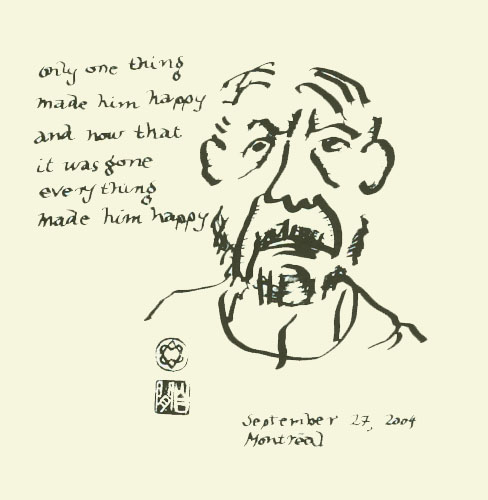Joshu and the poets
Monday, November 18th, 2019[ by Charles Cameron — From Joshu, Japanese zen master who recommends having a hot coal caught in your throat, metaphorically speaking, to Isaiah, Hebrew prophet, to whose lips it is said an angel pressed a burning coal ]
.
Said Joshu, proffering the word “Mu” in answer to the question “Does a dog have buddha nature? in one of the great koans of the Zen text, The Gateless Gate”:
If you really want to pass this barrier, you should feel as though you have a hot iron ball in your throat that you can neither swallow nor spit up. Then your previous conceptualizing disappears. Like a fruit ripening in season, subjectivity and objectivity are experienced as one.
You have a hot iron ball in your throat that you can neither swallow nor spit up. That’s how you must feel, so that by means of this koan, “your previous conceptualizing disappears” and “subjectivity and objectivity are experienced as one.”
There are few barriers in our contemporary western world so difficult to pass — “the first responders running towards the burning Twin Towers as everyone else was running away” would surely qualify.
**
And yet and yet.
And yet, the thing is, “buddha nature”, or”original face” as another koan names it, the condition in which “subjectivity and objectivity are experienced as one” is prior to the condition in which they are experienced separately as “subjectivity” and “objectivity” — it’s “original”.
So if yo find yourself suffering from “subjectivity” and “objectivity, you’ll need that “hot iron ball in your throat” to get back to origins. But if you’re there, where “subjectivity and objectivity are experienced as one” — no problem.
In fact, after you’ve “solved” — “resolved” might be better — a koan, your zen master is liable to suggest you look through a book of “capping verses” such as this one, Zen Sand, kindly published by the University of Hawaii Press, to find one verse that caps or sums up your experience.
The thing being that some poet wrote that verse, after experiencing something very close to what you experienced.
**
Which suggests that either:
literally hundreds of poets arrived at “subjectivity and objectivity are experienced as one” without going through the “hot iron ball in your throat” stage by being poets, in other words, they simply kept to the “original” state beyond dualism — in which case poetry sounds like a fine route by which to avoid all that throat-blistering terror or..
the poets routinely go through the “iron ball” barrier on their way to poetic clarity — a possibility which would oleave traces, surely, in their poems..
Such as:
Who, if I cried out, would hear me among the angels’ hierarchies?
and even if one of them pressed me suddenly against his heart:
I would be consumed in that overwhelming existence.
For beauty is nothing but the beginning of terror, which we are still just able to endure,
and we are so awed because it serenely disdains to annihilate us.
Every angel is terrifying.
And so I hold myself back and swallow the call-note of my dark sobbing.
That, as you may know, is Rilke, in the first of huis Duino Elegies.
Or this:
No worst, there is none. Pitched past pitch of grief,
More pangs will, schooled at forepangs, wilder wring. ..
My cries heave, herds-long; huddle in a main, a chief
Woe, wórld-sorrow; on an áge-old anvil wince and sing…
World sorrow — can there be any greater?
But those words are the words of a Catholic priest, a Jesuit, Gerard Manley Hopkins — and I left out the two most remarkable lines in that poem, lines in which he despairs of the Holy Spirit or Comforter, and the Virgin Mary, Mother of the world in Catholic theology:
Comforter, where, where is your comforting?
Mary, mother of us, where is your relief?
Coming from a Catholic pruiest, those are noteworthy, certainly surprising lines.
**
Or this, from Rilke again, triggered by Hopkins’ speaking of “world-sorrow” — here Orpheus speaks of Eurydice:
A woman so loved that from one lyre there came
more lament than from all lamenting women;
that a whole world of lament arose, in which
all nature reappeared: forest and valley,
road and village, field and stream and animal;
and that around this lament-world, even as
around the other earth, a sun revolved
and a silent star-filled heaven, a lament-
heaven, with its own, disfigured stars —:
So greatly was she loved.
It may be the poets ahve swallowed more grief than that “hot coal” could muster — but then consider the story told in Isaiah 6. 5-7,. Isaiah speaks:
Then said I, Woe is me! for I am undone; because I am a man of unclean lips, and I dwell in the midst of a people of unclean lips: for mine eyes have seen the King, the Lord of hosts.
Then flew one of the seraphims unto me, having a live coal in his hand, which he had taken with the tongs from off the altar: And he laid it upon my mouth, and said, Lo, this hath touched thy lips; and thine iniquity is taken away, and thy sin purged.
One may always wish, trembling, for an angelic visitation.







